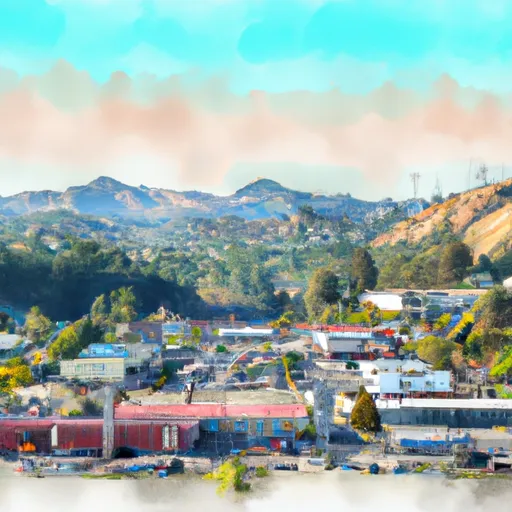-
 Snoflo Premium
Snoflo Premium
Get unlimited access to all our content
With no Ad interruptions! - Start Your Free Trial Login with existing account
Sawyers-Bar
Eden Index
Climate
8.7
•
Recreation
5.8
•
Community
•
Safeguard
5.5/10

Sawyers-Bar is a small community located in Siskiyou County, California. Known for its stunning natural beauty, the area offers various outdoor recreation opportunities for visitors.
The climate in Sawyers-Bar is classified as Mediterranean, characterized by warm, dry summers and cool, wet winters. Summers are generally mild with average temperatures ranging from the mid-70s to mid-80s Fahrenheit, while winters can be chilly with temperatures ranging from the mid-30s to mid-40s Fahrenheit. Precipitation is highest during the winter months, contributing to the lush green landscapes of the surrounding forests.
The hydrology constituents in the area primarily consist of the Klamath River, which runs nearby. The river is renowned for its fishing opportunities, attracting anglers from all over. Visitors can enjoy fly fishing for various species of trout, including rainbow, brown, and steelhead.
Outdoor recreation enthusiasts will find plenty to do in Sawyers-Bar. The region is known for its excellent hiking trails, offering breathtaking views and opportunities to explore the surrounding wilderness. Popular hikes include the Marble Mountain Wilderness and the Pacific Crest Trail. Additionally, the area is a great place for camping, birdwatching, wildlife viewing, and photography, making it an ideal destination for nature lovers.
What is the Eden Index?
The Snoflo Eden Index serves as a comprehensive rating system for regions, evaluating their desirability through a holistic assessment of climate health, outdoor recreation opportunities, and natural disaster risk, acknowledging the profound impact of these factors on livability and well-being.
Climate Health Indicator (CHI): 8.7
Sawyers-Bar receives approximately
1140mm of rain per year,
with humidity levels near 73%
and air temperatures averaging around
8°C.
Sawyers-Bar has a plant hardyness factor of
7, meaning
plants and agriculture in this region tend to thrive during the non-winter months.
By considering the ideal temperature range, reliable water supplies, clean air, and stable seasonal rain or snowpacks, the Climate Health Indicator (CHI) underscores the significance of a healthy climate as the foundation for quality living.
A healthy climate is paramount for ensuring a high quality of life and livability in a region, fostering both physical well-being and environmental harmony. This can be characterized by ideal temperatures, reliable access to water supplies, clean air, and consistent seasonal rain or snowpacks.
Weather Forecast
Streamflow Conditions
Klamath
Area Rivers
Klamath
Snowpack Depths
Klamath
Reservoir Storage Capacity
Klamath
Groundwater Levels
Recreational Opportunity Index (ROI): 5.8
The Recreational Opportunity Index (ROI) recognizes the value of outdoor recreational options, such as parks, hiking trails, camping sites, and fishing spots, while acknowledging that climate plays a pivotal role in ensuring the comfort and consistency of these experiences.
Access to outdoor recreational opportunities, encompassing activities such as parks, hiking, camping, and fishing, is crucial for overall well-being, and the climate plays a pivotal role in enabling and enhancing these experiences, ensuring that individuals can engage in nature-based activities comfortably and consistently.
Camping Areas
| Campground | Campsites | Reservations | Toilets | Showers | Elevation |
|---|---|---|---|---|---|
| Joss - Johnson Park (Etna City Park) | None | 2,964 ft | |||
| Eastfork | 6 | 2,388 ft | |||
| Oak Bottom | 26 | 1,517 ft | |||
| Mule Bridge - horse | 4 | 2,841 ft | |||
| Sarah Totten | 23 | 1,535 ft | |||
| Goldfield | 7 | 2,982 ft | |||
| Lovers Camp - horse | 8 | 4,157 ft | |||
| Shadow Creek | 10 | 2,939 ft | |||
| Bridge Flat | 4 | 2,251 ft | |||
| Indian Scotty | 44 | 2,514 ft |
Nearby Ski Areas
Catastrophe Safeguard Index (CSI):
The Catastrophe Safeguard Index (CSI) recognizes that natural disaster risk, encompassing floods, fires, hurricanes, and tornadoes, can drastically affect safety and the overall appeal of an area.
The level of natural disaster risk in a region significantly affects safety and the overall livability, with climate change amplifying these risks by potentially increasing the frequency and intensity of events like floods, fires, hurricanes, and tornadoes, thereby posing substantial challenges to community resilience and well-being.
Community Resilience Indicator (CRI):
The Community Resilience Indicator (CRI) recognizes that education, healthcare, and socioeconomics are crucial to the well-being of a region. The CRI acknowledges the profound impact of these elements on residents' overall quality of life. By evaluating educational resources, healthcare accessibility, and economic inclusivity, the index captures the essential aspects that contribute to a thriving community, fostering resident satisfaction, equity, and social cohesion.

